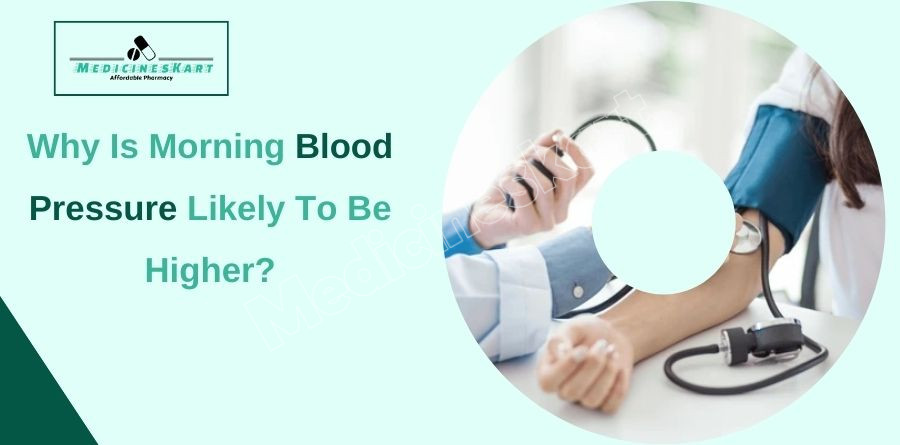Why Is Morning Blood Pressure Likely To Be Higher?
Morning blood pressure is often higher due to several physiological and hormonal changes that occur as part of the body’s natural circadian rhythm. Here’s a detailed explanation of why this happens:
1. Circadian Rhythm
- Biological Clock: The body’s internal clock, or circadian rhythm, influences various physiological processes, including it. It tends to follow a daily pattern, with lower readings at night and higher readings in the morning.
- Hormonal Fluctuations: In the early morning, the body releases hormones like cortisol and adrenaline, which prepare the body for waking up and increased activity. These hormones can increase heart rate and blood pressure.
2. Sympathetic Nervous System Activation
- Increased Sympathetic Activity: As you wake up, the sympathetic nervous system becomes more active. This system is responsible for the “fight or flight” response and can cause blood vessels to constrict, which raises blood pressure.
- Stress Response: The transition from a restful state to being active involves an increase in sympathetic nervous system activity, contributing to higher it in the morning.
3. Endocrine Changes
- Cortisol: Cortisol levels, a hormone released by the adrenal glands, peak in the early morning. Cortisol helps regulate metabolism, immune response, and blood pressure. Higher cortisol levels can contribute to increased blood pressure.
- Renin-Angiotensin-Aldosterone System (RAAS): This system, which helps regulate its fluid balance, may also become more active in the morning, contributing to elevated blood pressure.
4. Fluid Redistribution
- Fluid Retention: During sleep, fluids in the body tend to accumulate in the lower extremities due to gravity. When you lie down, the body reabsorbs this fluid. Upon waking, this fluid is redistributed, temporarily increasing it.
- Postural Changes: Standing up after lying down can cause a transient increase in a bit as the body adjusts to the new position and redistributes fluids.
5. Sleep Quality and Disorders
- Sleep Apnea: Conditions like obstructive sleep apnea can lead to higher blood pressure readings in the morning. Frequent interruptions in sleep can affect blood pressure regulation.
- Restlessness: Poor sleep or sleep disturbances can impact the body’s stress response and blood pressure regulation, contributing to higher morning readings.
6. Lifestyle Factors
- Morning Activities: Increased physical activity and stress in the morning as you start your day can also contribute to higher blood pressure. For example, rushing or dealing with morning stress can temporarily raise blood pressure.
7. Medication Timing
- Antihypertensive Medications: The effectiveness of these medications may vary depending on the timing of their administration. If medications are taken in the evening, their effect may wear off by morning, leading to higher blood pressure readings.
FAQs: Why is Morning Blood Pressure Likely to Be Higher?
Why is it typically higher in the morning?
- Answer: It often rises in the morning due to the body’s circadian rhythm, which leads to increased sympathetic nervous system activity and higher levels of hormones like cortisol and adrenaline as you wake up.
- What role do hormones play in the morning increase?
- Answer: Hormones such as cortisol and adrenaline peak in the morning, stimulating the cardiovascular system and increasing heart rate and blood pressure to prepare the body for the day.
How does fluid redistribution affect morning it?
- Answer: Fluid that accumulates in the lower extremities during sleep is reabsorbed and redistributed when you wake up, which can temporarily increase blood pressure.
- Can sleep disorders impact morning?
- Answer: Yes, conditions like sleep apnea and poor-quality sleep can lead to higher it readings in the morning due to disruptions in sleep and the body’s stress response.
Do lifestyle factors contribute to higher morning it?
- Answer: Yes, activities and stressors in the morning, such as rushing or engaging in physical activity, can contribute to temporarily elevated blood pressure.
- How do antihypertensive medications affect the morning?
- Answer: The timing of antihypertensive medications can influence their effectiveness. If taken in the evening, their effect may diminish by morning, leading to higher blood pressure readings.
Is it normal for the morning it to be higher than at other times of the day?
- Answer: It is generally normal for it to be higher in the morning due to natural physiological changes. However, consistently high morning blood pressure should be monitored by a healthcare provider.
Related Posts:
Vardenafil Reclaim Your Sexual Joy for All Time
The Vidalista Story Is Suddenly Trending Online!
Suhagra is One of The Best ED Drugs Ever!
Improving Your Sexual Health and Your Relationships with Fildena Meds
Summary
Morning it is typically higher due to a combination of circadian rhythm influences, increased sympathetic nervous system activity, hormonal changes, fluid redistribution, and lifestyle factors. This natural rise is generally normal, but persistent high morning blood pressure may indicate an underlying issue and should be monitored by a healthcare provider.



Leave a Reply